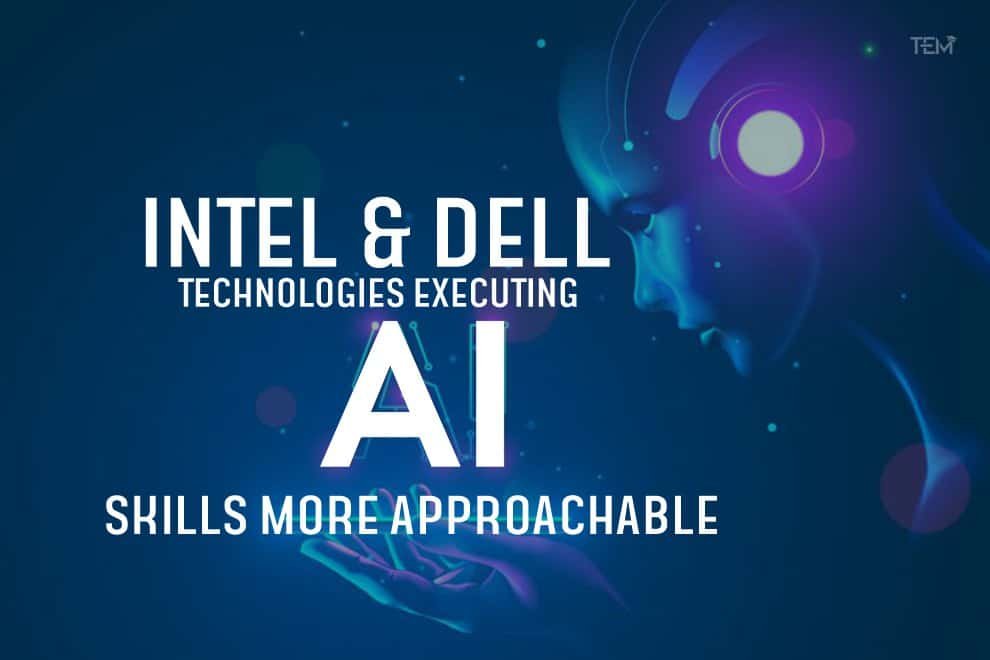Key Highlights:
- By 2025, AI will establish 97 million new employments.
- Throughout 2022 Intel and Dell Technologies plan to expand to 50 more universities.
- Intel delivers educational content for more than 200 hours
Impact of AI in Forthcoming Years
Artificial Intelligence has been one of the emerging technologies around the world. Numerous industries and entrepreneurs have finally begun to acknowledge the importance of AI Skills. Furthermore, the majority of industries are now utilizing AI in the day-to-day work. In the last few years, AI has effect impacted almost all aspects of life, both personally and professionally. AI is now present almost everywhere, for instance, AI products, applications, services, customer support, publicity. The impact of AI is such that it has now created a huge demand for AI-skilled employees/workers.
The World Economic Forum states that 97 million new jobs will be created by AI by the year 2025. All the employments design with occupations such as data analysts, researchers, and AI and machine learning experts, and big data experts. Furthermore, a recent EdScoop study is conducting by 246 higher educators, managers, and IT policymakers. It showed that 73% of educators report an increase in businesses’ need for AI-related graduates.
Financing the Courses
Intel officially disclosed that its Intel-AI Workforce Program had expanded significantly. In 2020, the Maricopa County Community College District, a project that is part of the Intel 2030 RISE objectives and challenges to global effect. It has been initiated to provide 30 million AI training partners with 30 governments and 30 000 institutions throughout the world.
The newly extended program will provide technical expertise and infrastructure in conjunction. Moreover, Dell Technologies assists students to achieve the required AI skills. This initiative will include the addition of 18 schools in 11 US states. To allow students attending the course to acquire an AI certificate or associate degree. Furthermore, Intel and Dell Technologies intend to extend to 50 additional universities and communities by 2022.
The two technology companies not only funding the courses but also supporting with technical and human resources. Dell Technologies supplies schools with technical expertise in the best way to organize AI workshops for personal, hybrid, and online learners. Intel provides more than 200 hours of educational content, including presentations for teachers, student workbooks, and evaluations.
Intensifying Technological Diversity
The AI program focuses on three fundamental AI technologies: computer graphics, language processing, and statistical approaches. The courses focus on the technical abilities of data collecting, computer vision, AI model training, and coding. These sessions also converge on social impacts and AI technology ethics. The content covers case applications from an industry that can be solved without AI-coding instruments to create your own AI model. Choosing and selecting content, each community college construct its own AI courses.
Gregory M. Bryant, Executive Vice President and Chief Executive of the Intel Corporation Client Computing Group, spoking the initiative with pride. Especially on the emphasis placed on colleges that offer opportunities for underrepresented communities to acquire skills to improve their paying jobs. “This program is helpful for diminished groups in economic development but also good for promoting diversity in technology. Something that Intel values profoundly and critically for developing AI and Machine Learning (ML),” explains Bryant.
Data from the American Association of Community Colleges indicate that 57% of university students are women, 27% Latin American, 13% Black, and 6% Asian/Pacific islanders. Focusing on these schools and working at the educator’s and the student’s levels demonstrate. Intel intends to affect society at several levels. The need is real, as shown by the absence of particular classes or programs in AI for 42% of the community colleges. The main cause for the lack of AI-oriented classes, according to educators themselves, is the shortage of teachers. 52% of EdSchool polled instructors responded that lack of faculties with the required competence is the greatest hindrance to delivering AI instruction. In addition, I hope that diversity will be taken into account in educational focus. As most community universities do not yet represent their diverse student body says, Bryant.
Also Read:- Top 25 Scholarships for International Students in USA










